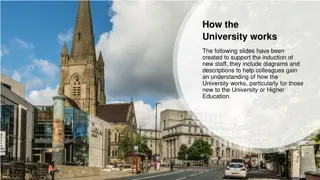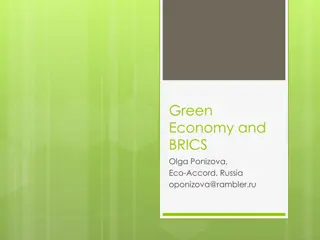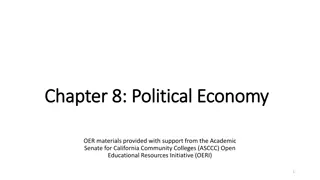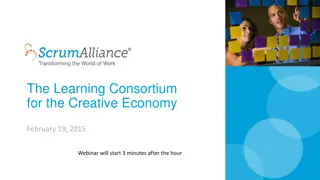Understanding International Political Economy (IPE) - A Comprehensive Overview
International Political Economy (IPE) explores the intricate interplay between society, politics, and economics on a global scale. It delves into the dynamics of state-market relations, examining how decisions are made regarding resource allocation and distribution across borders. Through the lens of IPE, one gains insights into the complex web of international systems that shape the production, exchange, and distribution of goods and services worldwide. Susan Strange's definition underscores the significance of human agency in shaping these arrangements, emphasizing the intersection of social, political, and economic factors in the global arena.
Download Presentation

Please find below an Image/Link to download the presentation.
The content on the website is provided AS IS for your information and personal use only. It may not be sold, licensed, or shared on other websites without obtaining consent from the author. Download presentation by click this link. If you encounter any issues during the download, it is possible that the publisher has removed the file from their server.
E N D
Presentation Transcript
What is International Political Economy IPE
International political economy is the study of a fundamental tension between and dynamic interaction of two spheres of life, which we can call as: Society and individuals, Politics and economics, or States and markets
One way to understand the basic of IPE is to pick apart its name Firstly, it deals with INTERNATIONAL It means that it deals with issues that cross national borders and with relations between and among nation-states. Secondly, IPE is POLITICAL It involves the use of state power to make decisions about who gets WHAT, WHEN and HOW in the society. Political process is a complex and multi-layered , that involves nation- states, bilateral relations among nation-states and many international organizations, regional alliances and global agreements. Lastly, IPE is about the ECONOMY or ECONOMICS It means that it deals with how scarce resources are allocated to different use and distributed among individual through the market process.
International Political Economy Political economy is the intellectual discipline that investigates the rich interface between economics and politics International political economy is the extension of that investigation to the international sphere. The study becomes international when it focuses on the aspects of state-market relations that extend beyond the borders of a single nation-state, becoming international, regional or global in nature.
Susan Strange gave clearest definition of international political economy as: IPE concerns the social, political and economic arrangements affecting the global systems of production, exchange and distribution and the mix of values reflected therein. Those arrangements are not divinely ordained, nor are they the fortuitous outcome of blind chance. Rather they are the result of human decision taken in the context of manmade institutions and sets of self-set rules and customs. There are several elements of this definition that are worthy to notice: IPE gives equal weight to social, political and economic arrangements and stresses that IPE is not just the study of institutions or organizations, but also of the values they reflect. States and markets are connected by global systems of production, exchange and distribution. Therefore, IPE looks at the ways that the states and markets of the world are connected to one another. The arrangements that IPE studies are the arrangements of lives, with particular emphasis on their global character. Some persons, like some nations, are wealthier than others and are more powerful than others or have higher status or greater authority than others. These conditions are the result of global structures or arrangements that produce, exchange and distribute social, political and economic resources.
Structures of International Political Economy IPE is a network of bargains between and among STATES (that deal in power) and MARKETS (that deal in wealth). These bargains determine the production, exchange and distribution of wealth and power. The IPE bargains, according to Professor Strange are; Relational Power the power of one player to get another player to do something Structural Power the power to shape and determine the structures of the global political economy within which other states, their political institutions, their economic enterprises and professional people have to operate
Structures of International Political Economy The previously mentioned structures are the institutions and the rules of the game that govern the behavior of states and markets in the IPE, which together produce, exchange and distribute wealth and power. The four global structures are; Security Production Finance Knowledge
Structures of International Political Economy i. The Security Structure The most basic human need When one person or group provides security for another, a security structure is created
Structures of International Political Economy ii. The Production Structure The production structure is defined as the sum of all arrangements determining what is produced, by whom and for whom, by what methods and on what terms. Production is the act of creating value and wealth and wealth is closely linked to power. The issue of who produces what for whom on what terms lies at the heart of IPE. Recent decades have seen dramatic changes in the production structure, with production of certain high-value items such as automobiles shifting from the USA to Japan and now to other countries, such as Korea, Mexico , Brazil and China. These structural changes affect the distribution of wealth and power in the world.
Structures of International Political Economy iii. The Finance Structure It is the pattern of money flows between and among nations This structure defines that who has access to money, how and on what terms Finance structure is a description of how certain resources are allocated and distributed between and among nations In this respect, money is a means, not an end
Structures of International Political Economy iv. The Knowledge Structure Knowledge is power, knowledge is wealth for those who can use it effectively. Nations with poor access to knowledge in the form of industrial technology, scientific discoveries, medical procedures and communications are at disadvantage relative to others. In todays world, the bargains made in the security, production and finance structures depend on access to knowledge.
Values and Viewpoints: Theoretical Perspectives on IPE There are variety of theories that attempt to describe; How states and nations should interact Normative theories How states really behave Positive theories The three main IPE theories are; Mercantilism or Economic Nationalism It looks IPE issues mainly in terms of national interest It is closely associated with political science It looks IPE issues mainly in terms of individual interests It is closely associated with the system of markets that are the study of economists Liberalism or Economic Liberalism It looks IPE issues mainly in terms of class interests It is closely associated with the methods of analysis employed by many sociologists Structuralism or Marxism
Mercantilism or Economic Nationalism Theories about relationship between economic activity and state power Three central propositions of Mercantilists are; Second, classical mercantilists argued that trade provided one way for countries to acquire wealth from abroad. First, the classical mercantilism argued that national power and wealth were tightly connected. Third, the classical mercantilists argued that some types of economic activities are valuable than others. National power in the international state system is derived in large part from wealth. Manufacturing activities should be promoted, while agriculture and other non-manufacturing activities should be discouraged. Wealth could be acquired through trade, only if the country ran a positive balance of trade. Wealth, in turn, is required to accumulate power.
Mercantilism or Economic Nationalism Modern mercantilism applies these three propositions to contemporary international economic policy. According to them, economic strength is a critical component of national power. The emphasis on wealth as a critical component of national power, the insistence on maintaining a positive trade balance and the conviction that some types of economic activities are more valuable than other leads mercantilists to argue that the state should play a large role in determining how society s resources are allocated.
Liberalism or Economic Liberalism Emerged during eighteenth century to challenge the dominance of mercantilism Adam Smith, David Ricardo and other scholars attempted to alter government economic policy. Challenged all three central propositions of mercantilism; Countries are not necessarily made wealthier by producing manufactured goods . They argued that countries do not enrich themselves by running trade surpluses, instead countries gain from trade, regardless of whether the trade balance is positive or negative Liberalism attempted to draw a strong line between politics and economics. Instead countries are made wealthier by making products that they can produce at relatively lower cost. They argued that the purpose of economic activity is to enrich individuals and not to enhance state power
Liberalism or Economic Liberalism They argued in favor of market-based system of resource allocation. Giving priority to welfare of individuals, liberalism argues that social welfare will be highest when people are free to make their own decisions about how to use the resources.
Structuralism or Marxism According to Marx, capitalism is characterized by two central conditions; The private ownership of the means of production. Marx argued that the value of manufactured goods was determined by the amount of labor used to produce them. However, capitalists do not pay labor the full amount of the value they imparted to the goods they produce. Marx predicted that the dynamics of capitalism would lead to a revolution that would do away with private property and with the capitalist system that private property supported.
Cont The three dynamics would interact to drive this revolution; o FIRST, Marx argued that there is a natural tendency towards the concentration of capital. Economic competitions would force capitalists to increase their efficiency and increase their capital stock. As a result, capital would become increasingly concentrated in the hands of a small, wealthy elite. o SECOND, Marx argued that capitalism is associated with a falling rate of profit. Investment leads to growing abundance of productive capital, which in turn reduces the return to capital. As profits shrink, capitalists are forced to further reduce wages, worsening the plight of already impoverished masses. o FINALY, capitalism is plagued by an imbalance between the ability to produce goods and the ability to purchase goods. Large capital investments continually augment the economy s ability to produce goods, while falling wages continually reduce the ability of consumers to purchase the goods being produced. As these three dynamics interact over time, society becomes increasingly characterized by growing inequality between a small wealthy capitalist elite and a growing number of impoverished workers. These social conditions eventually cause the workers to rise up, overthrow the capitalism and replace it with socialism.
Three Traditional Schools of International Political Economy Mercantilism Liberalism Marxism Important Actor The State Individuals Classes, particularly the class Role of the State Intervene in the economy to allocate resources Establish & enforce property rights to facilitate market-based exchange Uses state power to sustain capitalist system Image of the International Economic System Conflictual: countries compete for desirable industries and engage in trade conflicts a s a result of this competition Harmonious: the int l economy offers benefits to all countries. The challenge is to create a political framework that enables countries to realize these benefits. Exploitative: capitalists exploit labor within countries; rich countries exploit poor countries in the int l economy. Proper Objective of Economic Policy Enhance power of the Nation-State in Int l state system Enhance aggregate social welfare Promote an equitable distribution of wealth and income























